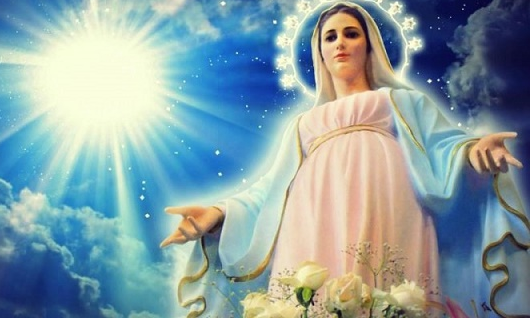Devotion to Mary: the importance of the Virgin in the Eucharist
From the relationship between the Eucharist and the individual sacraments, and from the eschatological meaning of the holy Mysteries, the profile of Christian existence emerges as a whole, called to be in every instant a spiritual cult, an offer of itself pleasing to God.
And if it is true that we are all still on the way towards the full fulfillment of our hope, this does not mean that we can already recognize with gratitude that what God has given us finds perfect fulfillment in the Virgin Mary, Mother of God and our Mother: his Assumption to heaven in body and soul is a sign of sure hope for us, as it indicates to us, pilgrims over time, that eschatological goal that the sacrament of the Eucharist makes us anticipate from now on.
In Mary Most Holy we also see the sacramental modality with which God reaches and involves the human creature in his saving initiative.
From the Annunciation to Pentecost, Mary of Nazareth appears as to the person
whose freedom is totally available to the will of God.
His Immaculate Conception is properly revealed in the unconditional docility to the divine Word.
Obedient faith is the form that his life takes in every moment when faced with action
of God.
Listening Virgin, she lives in full harmony with the divine will; keep in her heart the words that come from God and composing them as in a mosaic, learn to understand them more deeply (Luke 2,19-51).
Mary is the great believer who, full of trust, puts herself in the hands of God, abandoning herself to his will.
This mystery intensifies until it reaches full involvement in the redemptive mission of Jesus.
As Vatican II said, "the Blessed Virgin advanced in the pilgrimage of faith and faithfully preserved her union with the Son to the cross, where, not without a divine plan, he stood (John 19,15:XNUMX) suffering deeply with his Only begotten and associating with motherly spirit to the sacrifice of Him, lovingly consenting to the immolation of the victim generated by her; and finally, from the same Jesus dying on the cross was given as mother to the disciple with these words: Woman, behold your son ”.
From the Annunciation to the Cross, Mary is the one who welcomes the Word made flesh in her and has come to silence in the silence of death.
Finally, it is she who receives in his arms the body, now lifeless, of the One who truly loved his "to the end" (John 13,1).
For this reason, every time we approach the Body and Blood of Christ in the Eucharistic Liturgy, we also turn to Her who, by fully adhering to it, has accepted the sacrifice of Christ for the whole Church.
The Synod Fathers rightly said that "Mary inaugurates the participation of the Church in the sacrifice of the Redeemer".
She is the Immaculate Conception who unconditionally accepts the gift of God and, in this way, is associated with the work of salvation.
Mary of Nazareth, icon of the nascent Church, is the model of how each of us is called to welcome the gift that Jesus makes of himself in the Eucharist.
MARY, THE FAITHFUL VIRGIN
(St. Elizabeth of the Trinity)
O faithful Virgin, you remain night and day
in a profound silence, in an ineffable peace,
in a divine prayer that never ceases,
with the whole soul flooded with eternal splendors.
Your heart like a crystal reflects the Divine,
the Guest who inhabits it, the Beauty that does not set.
O Mary, you attract heaven and behold the Father gives you his Word
for you to be its mother,
and the Spirit of love covers you with its shadow.
The Three come to you; it is all the sky that opens and lowers down to you.
I adore the mystery of this God who incarnates in you, Virgin Mother.
Mother of the Word, tell me your mystery after the Incarnation of the Lord,
as on earth you passed all buried in adoration.
In an ineffable peace, in a mysterious silence,
you penetrated the unfathomable,
carrying in you the Gift of God.
Always keep me in a divine embrace.
That I carry within me
the imprint of this God of love.
